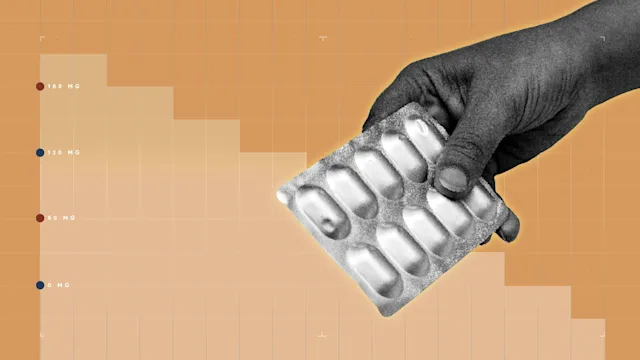Key takeaways:
Heart disease is the leading cause of death in women.
Your risk of heart disease increases after menopause.
There are steps you can take to reduce your heart disease risk.
Heart disease is the leading cause of death in women, and your risk increases after menopause. Menopause causes many changes in a woman’s body, which can affect your risk of heart disease and lead to heart issues in the future.
There are steps you can take to reduce your heart disease risk, no matter if you’re approaching menopause or already in your postmenopausal years. Read on to learn more about menopause and the heart, and what you can do to keep your heart healthy as you age.
What is menopause?
Menopause is when your periods slow down and stop. It usually happens between ages 45 and 55, but it may happen earlier in some women. When you’ve gone a full year without a period, you’ve officially “completed” menopause.
As you approach menopause, your ovaries begin producing less estrogen. You may notice symptoms including:
Hot flashes
Night sweats
Vaginal dryness and pain
Breast tenderness
Sleep disturbance
Mood changes
How is menopause linked to heart disease?
Menopause increases your risk for heart disease. This is because menopause is linked to many physical changes that can affect your heart health, including:
Stiffer blood vessels
Higher blood pressure
Higher LDL (“bad”) cholesterol levels
Lower HDL (“good”) cholesterol levels
Increased triglycerides
Increased blood sugar levels
Increased body weight
Increased fat deposits around your heart
All of these factors can play a role in your heart health and put you at risk for heart problems.
In addition, many women have poor sleep during menopause, which can worsen heart health.
Mood changes during menopause, including depression, have also been associated with an increase in:
Risk of heart disease
Coronary calcium scores (a measure of plaque in the coronary arteries)
What does a heart attack feel like for a woman? Three women share their stories of what it’s like to experience a heart attack.
What every woman should know about heart disease. Learn more about risk factors for heart disease in women and how to protect yourself.
How long does menopause last? Check out our guide to the stages and timeline of menopause.
Is there a connection between estrogen and heart disease?
Yes. There’s a relationship between estrogen and heart disease — but it’s not fully understood.
Here are three things we know:
Estrogen has a beneficial effect on the arteries by helping keep them flexible. (Flexible arteries help control blood pressure, decreasing the strain on your heart).
Estrogen affects cholesterol and blood sugar levels.
And the decrease in estrogen during menopause is associated with an increased risk of heart disease.
- Vivelle-DotDotti and Estradiol
- ClimaraEstradiol
- DivigelEstradiol
Is heart disease higher in women who go through early menopause?
Yes. Early menopause is when you go through menopause before turning 45. Studies have shown that women who go through early menopause have a higher risk of heart disease. Early menopause has also been linked to earlier plaque buildup in the heart.
What can I do to prevent heart problems during and after menopause?
There are specific steps you can take before, during, and after menopause to reduce your risk of heart disease. These include:
Having a comfortable weight
Following a heart-healthy diet
Doing regular exercise
Limiting alcohol use
Keeping other health conditions under control, such as high blood pressure, diabetes, and high cholesterol
There may also be medications that may lower your risk for heart problems — such as blood pressure medications, aspirin, or statins. You can discuss these with your primary care provider.
How does menopausal hormone therapy impact my risk of heart disease?
Menopausal hormone therapy (MHT) is a group of medications that are used to treat menopause symptoms. In the past, it’s also been called hormone replacement therapy (HRT). But MHT is the preferred term these days. That’s because it better describes how hormones can be used as a tool to treat symptoms, rather than just “replacing” a hormone deficiency.
MHT typically includes two types of hormones: estrogen and progestogens. These hormones help relieve menopause symptoms. And they can have other health benefits as well — including benefits for your heart. And just like all medications, MHT comes with some risks as well.
Heart-specific health benefits of MHT
Studies have shown that women who begin MHT within 10 years of menopause may have a lower risk of heart disease.
MHT may also benefit your heart in other ways, too, including:
Relaxing your blood vessels
Improving your cholesterol levels
Lowering your risk of developing Type 2 diabetes in the future
Improving blood sugar if you already have diabetes
Decreasing plaque buildup in your arteries
Other health benefits of MHT
MHT can have other health benefits too. These include:
Reducing menopause symptoms, like hot flashes, mood changes, and sleep problems
Reducing vaginal dryness and pain during sex
Decreasing urinary tract infections and bladder problems
Keeping your bones strong and healthy
Risks of MHT
Although the benefits of MHT may outweigh risks for many women, there can be an increased risk of a stroke or blood clots while using it.
Uterine (endometrial) and breast cancer risk may be concerns for some women too. Taking estrogen alone may increase your risk of endometrial cancer. But it appears that taking progestin at the same time helps lower this risk.
MHT is also linked to a risk of breast cancer. But the risk only seems to appear after 3 to 5 years of using combined estrogen and progestogen therapy, or after 7 years for estrogen therapy alone.
When should I talk to my doctor about heart health?
It’s not too early to have a conversation with your primary care provider about reducing heart disease risk. Even if you’re far from menopause, there may be steps you can take to reduce your risk of heart disease later.
If you’re approaching menopause, or have recently gone through it, you may be a candidate for MHT. As we just discussed, MHT might not only reduce your heart disease risk. It can come with many other benefits too — both for your heart health and your quality of life.
Even if you think you might be the wrong age to start MHT, it’s still worth having a conversation with your primary care provider or OB-GYN. In some cases, the benefits may outweigh the risks.
Frequently asked questions
Yes. Many women may experience heart palpitations (heart “flutters,” or irregular pounding) during perimenopause or menopause. These are often related to hormone changes like low estrogen and aren’t usually a cause for concern.
But sometimes they can indicate an underlying heart problem. That’s especially true if they last for more than a few seconds or are associated with chest pain, shortness of breath, or dizziness. In that case, it’s important to discuss your symptoms with a healthcare professional.
Yes, it’s possible to have chest pain as a symptom of menopause. But if you experience sudden pressure, chain, or discomfort in your chest, it could be a sign that you’re experiencing a heart attack.
Women can also have different heart attack symptoms from men, like lightheadedness or pain or discomfort in other areas of the body.
The main point here: If you’re concerned about a heart attack, you should call 911 or go to the emergency room right away.
Yes. Many women may experience heart palpitations (heart “flutters,” or irregular pounding) during perimenopause or menopause. These are often related to hormone changes like low estrogen and aren’t usually a cause for concern.
But sometimes they can indicate an underlying heart problem. That’s especially true if they last for more than a few seconds or are associated with chest pain, shortness of breath, or dizziness. In that case, it’s important to discuss your symptoms with a healthcare professional.
Yes, it’s possible to have chest pain as a symptom of menopause. But if you experience sudden pressure, chain, or discomfort in your chest, it could be a sign that you’re experiencing a heart attack.
Women can also have different heart attack symptoms from men, like lightheadedness or pain or discomfort in other areas of the body.
The main point here: If you’re concerned about a heart attack, you should call 911 or go to the emergency room right away.
The bottom line
Menopause can bring many changes that affect your heart health and put you at risk for heart problems in the future. You can take care of your heart by making heart-healthy choices during menopause and beyond — like eating well, exercising, and limiting alcohol and tobacco.
And for many women, hormone therapy can not only ease menopause symptoms but also help protect your heart. Talk to your primary care provider to learn more about what you can do to keep your heart healthy both now and in the decades to come.

Why trust our experts?



References
American Cancer Society. (2015). Menopausal hormone therapy and cancer risk.
American College of Cardiology. (2017). Hormone replacement therapy associated with lower early mortality. ScienceDaily.
American Heart Association. (2022). Heart attack symptoms in women.
American Heart Association. (2024). Menopause and cardiovascular risk.
British Heart Foundation. (n.d.). Menopause and your heart.
Carpenter, J. S., et al. (2021). A systematic review of palpitations prevalence by menopausal status. Current Obstetrics and Gynecology Reports.
Centers for Disease Control and Prevention. (2023). About women and heart disease.
Centers for Disease Control and Prevention. (2024). Health effects of cigarettes: Cardiovascular disease.
Crespo, C. J., et al. (2002). Hormone replacement therapy and its relationship to lipid and glucose metabolism in diabetic and nondiabetic postmenopausal women: Results from the third National Health and Nutrition Examination Survey (NHANES III). Diabetes Care.
El Khoudary, S. R., et al. (2015). Cardiovascular fat, menopause, and sex hormones in women: The SWAN cardiovascular fat ancillary study. The Journal Of Clinical Endocrinology And Metabolism.
El Khoudary, S. R., et al. (2020). Menopause transition and cardiovascular disease risk: Implications for timing of early prevention: A scientific statement from the American Heart Association. Circulation.
European Society of Cardiology. (2024). Menopause potentially linked to adverse cardiovascular health through blood fat profile changes.
Glassberg, H., et al. (1999). Exercise and heart disease in women: Why, how, and how much? Cardiology in Review.
Janssen, I., et al. (2011). Depressive symptoms are related to progression of coronary calcium in midlife women: The Study of Women's Health Across the Nation (SWAN) heart study. American Heart Journal.
Kawecka-Jaszcz, K., et al. (2002). The effect of hormone replacement therapy on arterial blood pressure and vascular compliance in postmenopausal women with arterial hypertension. Journal of Human Hypertension.
Kodoth, V., et al. (2022). Adverse changes in body composition during the menopausal transition and relation to cardiovascular risk: A contemporary review. Women’s Health Reports.
Kohn, J. C., et al. (2015). Age-related vascular stiffening: Causes and consequences. Frontiers in Genetics.
Ley, S. H., et al. (2017). Duration of reproductive life span, age at menarche, and age at menopause are associated with risk of cardiovascular disease in women. Journal of the American Heart Association.
Makarem, N., et al. (2019). Association of sleep characteristics with cardiovascular health among women and differences by race/ethnicity and menopausal status: Findings from the American Heart Association Go Red for Women strategically focused research network. Sleep Health.
Miller, V. M., et al. (2008). Vascular actions of estrogens: Functional implications. Pharmacological Reviews.
Million Hearts. (2019). Recipes for a heart-healthy lifestyle. Division for Heart Disease and Stroke Prevention.
Office on Women’s Health. (2022). Early or premature menopause. Office of the Assistant Secretary for Health.
Schreinlechner, M., et al. (2020). Early onset of menopause is associated with increased peripheral atherosclerotic plaque volume and progression. Atherosclerosis.
The Menopause Society. (n.d.). Hormone therapy.
Wassertheil-Smoller, S., et al. (2004). Depression and cardiovascular sequelae in post menopausal women: The Women's Health Initiative (WHI). Archives of Internal Medicine.














